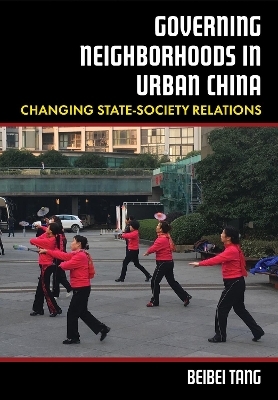
Governing Neighborhoods in Urban China
Changing State-Society Relations
Seiten
2023
Cornell University Press (Verlag)
978-1-5017-6926-9 (ISBN)
Cornell University Press (Verlag)
978-1-5017-6926-9 (ISBN)
Governing Neighborhoods in Urban China examines the key mechanisms operating at the grassroots level in China that contribute to urban development and increased public support for the legitimacy and authority of the Chinese state. Beibei Tang uncovers new trends and dynamics of urban neighborhood governance since the 2000s to reveal the significant factors that contribute to regime survival.
Tang introduces the concept of hybrid authoritarianism, a governance mechanism an authoritarian state employs to produce governance legitimacy, public support, and regime sustainability. Hybrid authoritarianism is situated in an intermediary governance space between state and society. It accommodates both state and non-state actors, deals with a wide range of governance issues, employs flexible governance strategies, and in this context, ultimately strengthens CCP leadership.
Tang documents processes of hybrid authoritarianism through her focus on various types of urban neighborhoods, including new urban middle-class neighborhoods, and the increasing urbanization of the countryside. Governing Neighborhoods in Urban China provides a conceptual framework that avoids scholarly approaches that tend to reify either one-party autocracy or Western-centric notions of democracy.
Tang introduces the concept of hybrid authoritarianism, a governance mechanism an authoritarian state employs to produce governance legitimacy, public support, and regime sustainability. Hybrid authoritarianism is situated in an intermediary governance space between state and society. It accommodates both state and non-state actors, deals with a wide range of governance issues, employs flexible governance strategies, and in this context, ultimately strengthens CCP leadership.
Tang documents processes of hybrid authoritarianism through her focus on various types of urban neighborhoods, including new urban middle-class neighborhoods, and the increasing urbanization of the countryside. Governing Neighborhoods in Urban China provides a conceptual framework that avoids scholarly approaches that tend to reify either one-party autocracy or Western-centric notions of democracy.
Beibei Tang is Professor of China Studies, School of Humanities and Social Sciences at Xi'an Jiaotong-Liverpool University, Suzhou. She is the author of China's Housing Middle Class, and the co-editor of Suzhou in Transition.
| Erscheinungsdatum | 18.04.2023 |
|---|---|
| Zusatzinfo | 2 charts - 2 Charts |
| Verlagsort | Ithaca |
| Sprache | englisch |
| Maße | 152 x 229 mm |
| Gewicht | 454 g |
| Themenwelt | Geisteswissenschaften ► Geschichte ► Regional- / Ländergeschichte |
| Sozialwissenschaften ► Politik / Verwaltung ► Staat / Verwaltung | |
| Sozialwissenschaften ► Soziologie | |
| ISBN-10 | 1-5017-6926-X / 150176926X |
| ISBN-13 | 978-1-5017-6926-9 / 9781501769269 |
| Zustand | Neuware |
| Informationen gemäß Produktsicherheitsverordnung (GPSR) | |
| Haben Sie eine Frage zum Produkt? |
Mehr entdecken
aus dem Bereich
aus dem Bereich
die Geschichte meiner Urgroßmutter
Buch | Hardcover (2025)
C.H.Beck (Verlag)
CHF 32,15
Träume und Macht : eine Biografie
Buch | Hardcover (2025)
C.H.Beck (Verlag)
CHF 61,60


